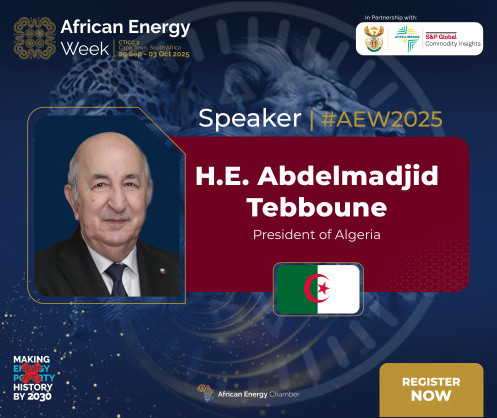On the back of its latest licensing round, Algeria is witnessing a surge in exploration and production projects
Abdelmadjid Tebboune, President of the Republic of Algeria, will speak at this year’s African Energy Week (AEW): Invest in African Energies conference. President Tebboune’s participation comes as the country paves the way for a $50 billion investment drive over the next four years and underscores Algeria’s commitment to working with international partners to bolster exploration and production.
Under President Tebboune’s leadership, Algeria has implemented bold development plans for the oil and gas industry, striving to consolidate its position as an international export hub. The country has undertaken an ambitious investment drive and continues to attract foreign capital to the market through strengthened partnerships and improved business terms. With a focus on promoting frontier acreage, increasing gas production and creating investment opportunities in green hydrogen and regional infrastructure projects, President Tebboune is laying the foundation for long-term, sustainable economic growth in Algeria. At AEW: Invest in African Energies 2025, President Tebboune is expected to share insights into this strategy, highlighting upcoming investment opportunities and regulatory reform.
AEW: Invest in African Energies is the platform of choice for project operators, financiers, technology providers and government, and has emerged as the official place to sign deals in African energy. Visit http://www.AECWeek.com for more information about this exciting event.
” Algeria’s diversified energy strategy should serve as a strong example for other resource-rich nations in Africa “
As one of Africa’s biggest oil and gas producers, Algeria is leveraging policy reform to attract new investment in exploration projects. A cornerstone of this strategy is the country’s ongoing licensing round, which offers six onshore blocks to international and domestic companies. Launched in November 2024, the bid round will host a bid opening ceremony in June 2025, with the National Agency for the Valorization of Hydrocarbon Resources in Algeria expected to award at least five of the six blocks. This latest licensing round falls part of a five-year plan which features multiple bid rounds, aimed at offering acreage in high-potential geological zones and combining a mix of greenfield and brownfield assets. This multi-year strategy showcases the commitment of the government to increasing the competitiveness of investing in Algeria.
Beyond the licensing rounds, President Tebboune has enacted a series of policy reforms aimed at improving the business environment for foreign operators. These include the introduction of a Hydrocarbon Law in 2019, offering improved fiscal terms to those of 2013 legislation. Since the enactment of this law, production has rebounded significantly in Algeria, with gas sales alone projected to remain at 10 billion cubic feet per day until the end of the decade. Targeting 200 billion cubic meters in gas production over the five years, the Hydrocarbon Law of 2019 will continue playing an instrumental part in attracting investment to the market.
On the back of this law, a number of international oil companies have expanded their investments in Algeria. ExxonMobil and Chevron are exploring for hydrocarbon resources in the Ahnet, Gourara and Berkine basins; Eni and Equinor are revitalizing the In Salah and In Amenas fields; while TotalEnergies is leading gas appraisal and development in Timimoun. In tandem, Algeria’s national oil company Sonatrach is rapidly expanding its portfolio, with strategic investments in the Zarzaitine oilfield and revived operations at the Alrar gas complex. In 2024, Sonatrach made eight new hydrocarbon discoveries and in 2025, seeks to achieve 1.2 million barrels in daily production.
Beyond oil and gas, President Tebboune has set green hydrogen development as a priority for the country, underscoring the role the resource will play in facilitating a just energy transition in Algeria. The country is emerging as a green hydrogen leader in Africa, with projects such as the SoutH2 Corridor project – a 3,300 km pipeline network developed in partnership with European stakeholders – transforming the market. The project repurposes natural gas pipelines to transport green hydrogen, leveraging the continent’s strategic resources and growing European demand to bolster exports. Operations are planned for 2030, with the project set to transport up to four million tons of hydrogen per year. Looking ahead, investments in green hydrogen are expected to diversify the market while creating new business opportunities for regional firms.
“Algeria’s diversified energy strategy should serve as a strong example for other resource-rich nations in Africa. By prioritizing oil and gas exploration, reforming policies to attract spending and working closely with international partners to establish sustainable export networks, Algeria is establishing itself as an international energy hub. President Tebboune has played an instrumental role in making the country what it is today: an attractive, growth-oriented market,” states NJ Ayuk, Executive Chairman of the African Energy Chamber.



Comments are closed, but trackbacks and pingbacks are open.